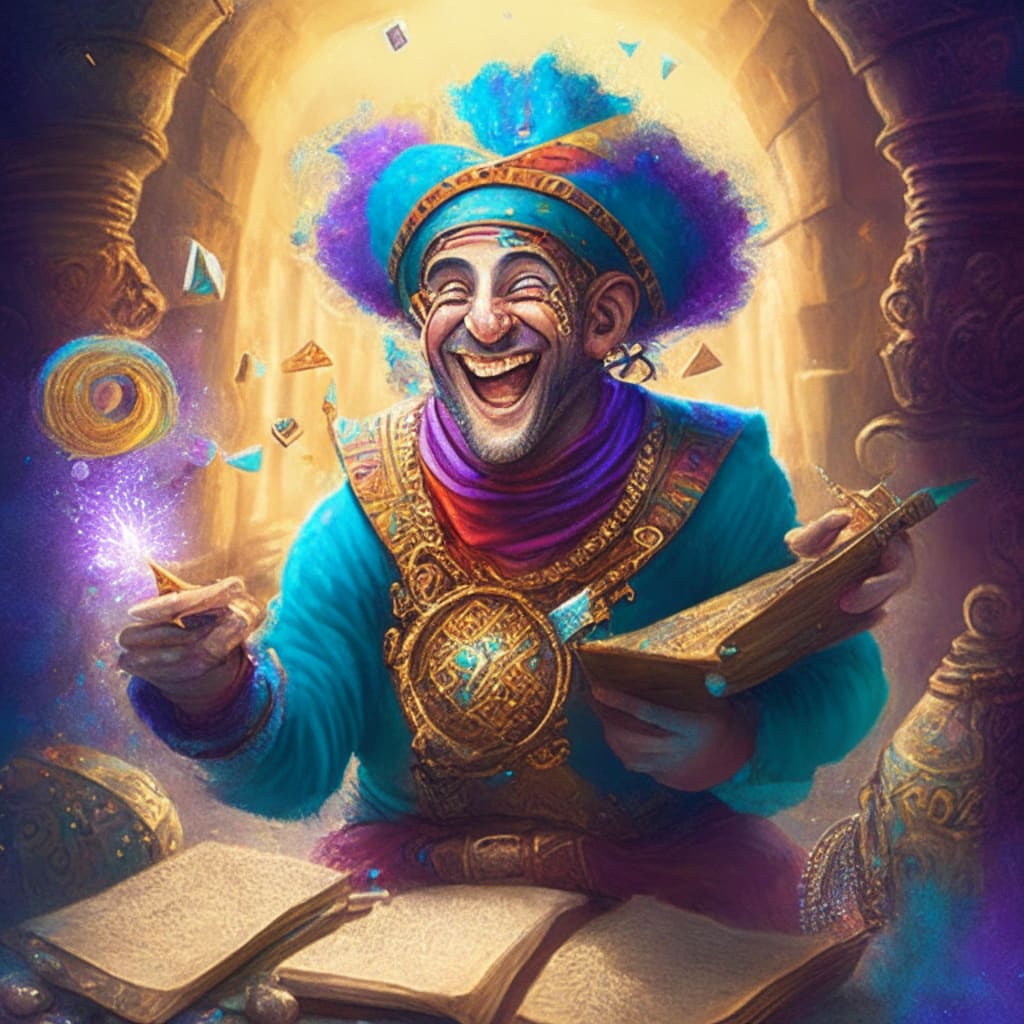
Take this adventure with me as I create a past life fictional story as a scribe, in Ancient Egypt.
So, dear reader, as Ptolemy traverses the corridors of the labyrinth, turning mundane scribal duties into uproarious adventures, let us ponder: What treasures might we find if we approach life with a light-hearted spirit and a quill poised to capture the humor that surrounds us? Can we uncover the joy that lies hidden within the maze of our daily lives? The answers, perhaps, await us in the laughter-filled escapades of Ptolemy, the quirky scribe.
Chapter 1: A Scribal Prodigy's Birth

With a mischievous sparkle in his eyes, a peculiar scribe named Ptolemy entered the world in the vibrant city of Alexandria, famous for its intellectual prowess and remarkable architecture. His strokes danced across the papyrus with such grace that onlookers were left in awe as soon as he picked up his first quill.
Nevertheless, Ptolemy was more than a great penman. His gift was to turn mundane things into whimsical tales that tickled the funny bones of all who read them. In the margins of his scribe lessons as a child, he would scribble comical doodles, much to the delight of his teachers.
As Ptolemy grew older, his talent blossomed like a lotus in the Nile. He became the talk of the town, entertaining friends and neighbors with uproarious stories that had them laughing on the floor. Even in the most mundane circumstances, he was able to find humor despite his limitless wit.
In a corner of Ptolemy's humble abode, a dusty old scroll caught his eye one day. As his curiosity gnawed at him like a hungry crocodile, he gingerly opened it, and it revealed the hidden secrets of the treasure rumored to be hidden within the Labyrinth of Minos.
As Ptolemy imagined himself as an explorer attempting to conquer the labyrinth for riches beyond his wildest dreams, his heart raced with excitement. With quill in hand and a mischievous glint in his eye, he embarked on a hilarious quest that would forever intertwine his scribal duties with his treasure-hunting adventures.
The journey ahead would test Ptolemy's wit as well as his patience, but little did he know that he would face absurd assignments. It turned out to be a comical misadventure as he deciphered cryptic riddles scrawled on ancient walls and navigated through mazes that had a mind of their own.
During Ptolemy's exploration of the labyrinth's labyrinthine corridors, he encountered Anubis, the jackal-headed god of the afterlife. Instead of trembling in fear, Ptolemy laughed when he saw the god's confused face. He was surprised to find Anubis joining the fun, and their laughter echoed throughout the stone passages.
Their unexpected camaraderie forged an unlikely friendship that transcended mortal and divine boundaries. Anubis, usually stoic and serious, discovered the joy of laughter through Ptolemy's contagious sense of humor. Together, they embarked on a series of hilarious adventures, playing pranks on unsuspecting souls and weaving laughter into the tapestry of ancient Egypt.
But amidst all the laughter and tomfoolery, Ptolemy's heart yearned for something more. Amid his scribal exploits, he stumbled upon the enchanting Thalia, a spirited librarian with a penchant for organizing papyrus scrolls. Their love blossomed amidst stacks of ancient wisdom and ink-stained fingertips, creating a romance as peculiar and delightful as their own unique personalities.
With Thalia by his side, Ptolemy's scribal endeavors took on an even more whimsical and humorous hue. They collaborated on hilarious tales that tickled the imaginations of readers across the kingdom. Their combined wit and charm created a literary fusion that was the talk of the town, leaving readers eagerly anticipating their next comedic masterpiece.
As soon as news of Ptolemy's uproarious escapades reached Cleopatra, the illustrious queen of Egypt, she became aware of it. When she realized how the scribe could make even the soberest soul laugh, she summoned him into her opulent palace, hoping to escape her regal duties for a while.
The mischievous twinkle in Ptolemy's eye as he approached the palace. Cleopatra, her royal demeanor momentarily set aside, revealed a mischievous side of her own. She devised a papyrus prank to play on her trusted advisor, a man known for his stoic disposition and lack of appreciation for humor.
With ink-stained fingers and conspiratorial whispers, Ptolemy and Cleopatra executed their audacious plan, turning the advisor's royal correspondence into a comical masterpiece that left him bewildered and the palace in fits of laughter.
The escapade spread like wildfire throughout the kingdom, earning Ptolemy an even greater reputation as a master of mirth. But with fame came rivalry, and Ptolemy's path crossed with that of Hieronymus, a pompous scribe known for his dry wit and disdain for laughter.
Hieronymus, eager to overshadow Ptolemy's reputation, challenged him to a scribal duel of wits in front of the Pharaoh himself. The royal court gathered with bated breath, unsure of what to expect from the clash of these two formidable scribes.
Quill met quill as Ptolemy and Hieronymus engaged in a battle of words, each trying to outdo the other with clever wordplay and quick comebacks. The Pharaoh, known for his stern countenance, couldn't help but burst into laughter at their absurd banter. The court erupted in applause and mirth, with Ptolemy emerging as the victor, his wit shining like a supernova.
In recognition of Ptolemy's unrivaled wit and ability to spread laughter throughout the kingdom, a grand festival was organized in his honor. Jesters, clowns, and mimes gathered from all corners of the realm; their antics interwoven with Ptolemy's uproarious tales.
As the festival celebrated the joy and mirth that Ptolemy had instilled in the people of Alexandria, laughter filled the streets. He became synonymous with laughter and merriment, and his stories of comedic scribal escapades were passed down from generation to generation.
Even today, Ptolemy remains etched in the annals of history as the quirky scribe who brought laughter to the ancient world. It is his legacy that brightens the darkest corners of human existence, reminding us of the joy and power of humor.
Chapter 2: Ancient Secrets and Absurd Assignments
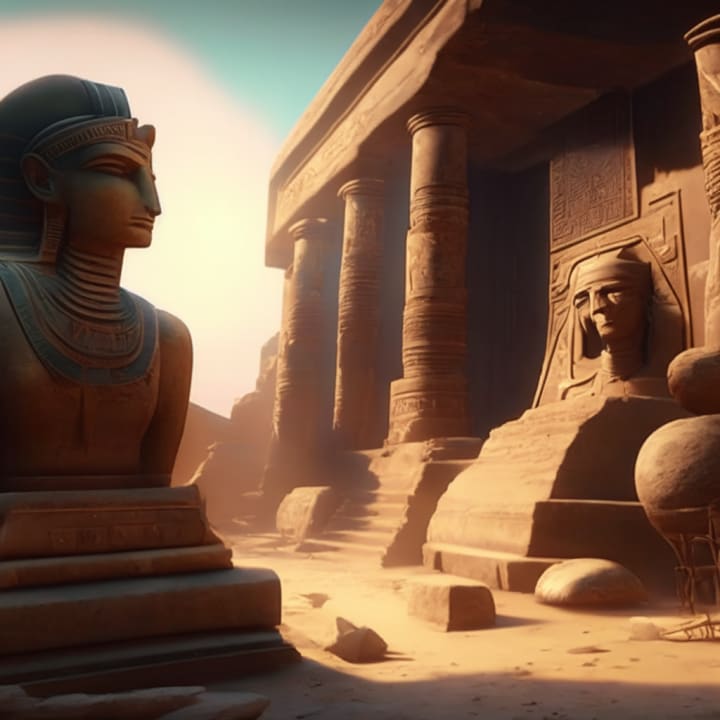
Under the tutelage of the eccentric Chief Scribe, Ptolemy's scribal journey took an unexpected turn when he stumbled upon a dusty scroll that whispered of hidden treasures concealed within the infamous Labyrinth of Minos. Armed with a quill and his unyielding curiosity, Ptolemy embarked on a hilarious quest, juggling his daily scribal duties with his treasure-hunting escapades.
As Ptolemy delved deeper into the labyrinthine corridors of the ancient maze, he encountered a myriad of absurd assignments. The Chief Scribe, in his quirkiness, tasked Ptolemy with deciphering hieroglyphic riddles while balancing stacks of papyrus scrolls on his head. It was an endeavor that required both intellectual prowess and impeccable posture.
Ptolemy found himself muttering ancient riddles to himself as he roamed the halls of the palace, much to the amusement of the passing courtiers. They would stop and listen, exchanging bewildered glances before erupting into laughter. Ptolemy's comical recitations echoed through the marble corridors, turning the palace into a stage for his impromptu comedy performances.
The labyrinth proved to be a masterful prankster itself. Doors would mysteriously close just as Ptolemy approached them, leaving him baffled and scratching his head. Secret passages would materialize out of thin air, leading him in circles and testing his sense of direction. Ptolemy's challenge-filled trip through the labyrinth appeared to be determined to keep him on his toes.
Despite this, Ptolemy was not one to back down from a challenge, especially if it involved a good laugh. Whenever he was assigned an absurd task, he greeted it with a mischievous twinkle in his eye and a quill poised to turn it into a whimsical story. Among his scribal duties, he incorporated witty wordplay and clever puns, much to his colleagues' delight.
One day, as Ptolemy unraveled the riddle of a particularly cryptic inscription, he accidentally triggered a hidden mechanism. The floor beneath him shifted, sending him tumbling into a hidden chamber. It was there that he discovered a trove of comedic relics—a collection of ancient joke books, each filled with the rib-tickling humor of bygone eras.
From that moment on, Ptolemy's scribal journey became a delightful fusion of treasure hunting and comic exploration. He would excavate the halls of the labyrinth in search of hidden artifacts, all the while unraveling ancient jokes and sharing them with anyone who crossed his path. Laughter became his trusty companion, accompanying him through the twists and turns of his absurd assignments.
Amidst the laughter and merriment, Ptolemy wondered: Where were the treasures he sought, or were they the moments of joy and hilarity he encountered along the way? His tales were filled with wit and whimsy, and he realized that the most precious treasure was his ability to find laughter in the most unexpected of circumstances.
Chapter 3: A Comedic Encounter with Anubis
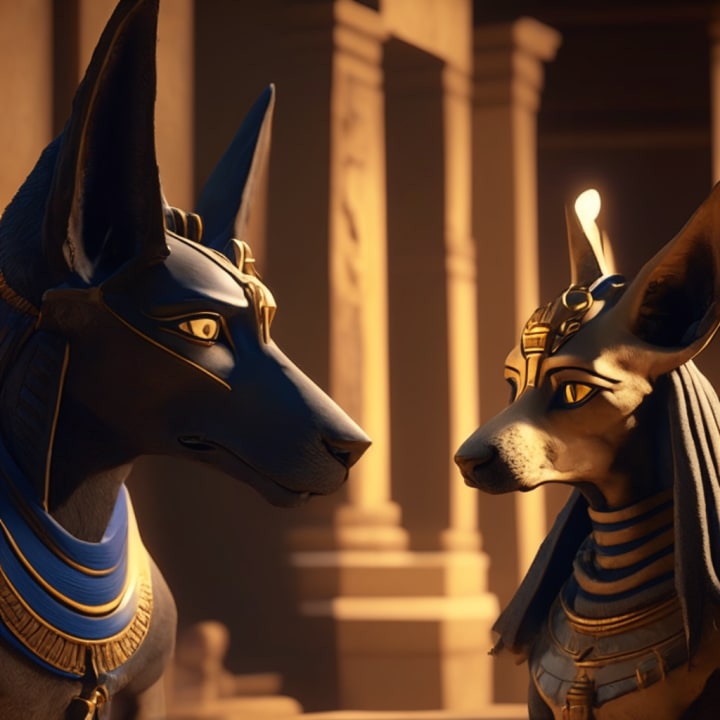
Ptolemy met Anubis, the jackal-headed afterlife god, during his travels through the labyrinth. The ancient deity's sense of humor was tickled by Ptolemy's quick wit and infectious laugh, forging an unlikely friendship that transcended mortal and divine boundaries.
As they explored the winding passages, Ptolemy couldn't resist cracking jokes about the challenges they encountered. Anubis, known for his serious demeanor, succumbed to fits of laughter that echoed through the stone halls.
Their misadventures became legends. They stumbled upon enchanted doors that quacked like ducks when opened, causing both to burst into uncontrollable laughter. Ptolemy even convinced Anubis to try his hand at scribbling amusing hieroglyphics on the walls, an act that had never been witnessed before.
Together, they faced absurd obstacles, like an overzealous maze guardian who would burst into a song and dance routine at the slightest provocation. Ptolemy and Anubis couldn't help but join in, their clumsy moves and off-key singing drawing smiles from even the most stoic statues.
With each comedic encounter, Ptolemy and Anubis bonded further, their shared laughter bridging the gap between the mortal realm and the divine. The gods themselves marveled at the sight of Anubis, a deity known for his solemn duty, embracing the joy of laughter.
Chapter 4: Love Among the Papyrus Scrolls
Amidst his adventurous scribal exploits, Ptolemy's path intertwined with the enchanting Thalia, a spirited librarian with a penchant for organizing papyrus scrolls. Their love blossomed amidst stacks of ancient wisdom and ink-stained fingertips, creating a romance as peculiar and delightful as their own unique personalities.
Thalia, with her playful spirit, encouraged Ptolemy to explore even wilder realms of humor. Their evenings were filled with laughter as they scribbled comical anecdotes and witty dialogues, each trying to outdo the other in their quest for mirth.
In the heart of the great library, Ptolemy penned stories that made even the most somber scholars’ chuckle. As they shared their creative joy, Thalia's contagious laughter provided a soundtrack to their lives.
As time passed, their love for each other and their craft grew stronger. Through the trials and tribulations of life, they found solace in humor. Laughter became a shield, protecting them from monotony and illuminating their darkest days.
Together, they brought laughter to the lives of others, using their scribal talents to spread joy and lightness. Their comedic tales were whispered in hushed voices, shared from person to person like precious treasures. Ptolemy and Thalia became the catalysts of laughter, reminding the world that even in the face of adversity, humor could be found.
Chapter 5: The Royal Papyrus Prank
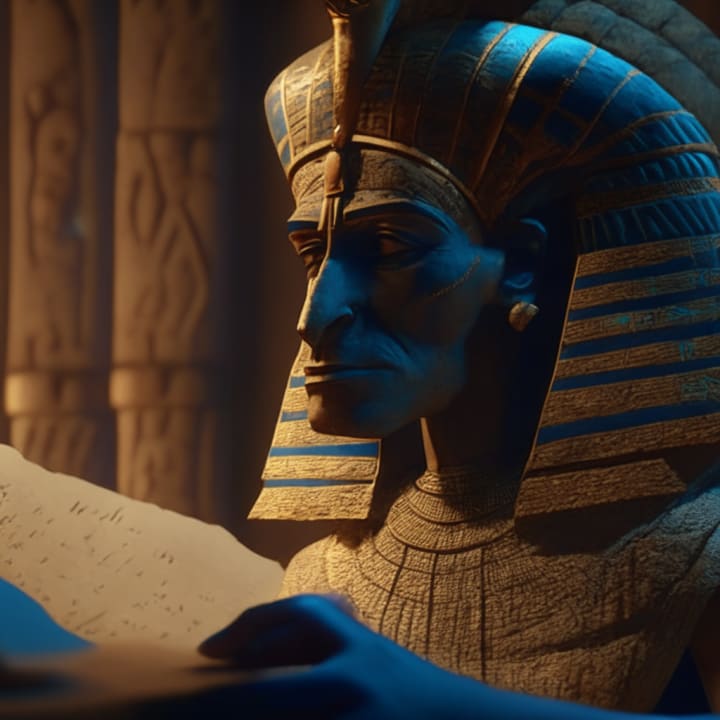
Summoned once again to the opulent palace of Cleopatra, Ptolemy found himself tangled in a web of royal mischief. The mischievous queen, seeking respite from the weight of her regal duties, enlisted Ptolemy's help to pull off an audacious papyrus prank on her trusted advisor. With an uproarious plan and ink-stained fingers, Ptolemy and Cleopatra unleashed laughter that reverberated through the palace walls.
The plan involved switching the advisor's meticulously prepared speech with a nonsensical scribble, filled with humorous quips and silly anecdotes. Ptolemy's nimble fingers danced across the papyrus, crafting a comedic masterpiece that would leave the advisor scratching his head in confusion.
As the advisor delivered his speech before the court, the laughter started as a soft chuckle and quickly transformed into uncontrollable fits. Even the Pharaoh struggled to stifle his amusement, his regal composure crumbling in the face of the unexpected hilarity.
Bewildered by the reaction, the advisor tried to regain his composure, but failed miserably. Despite his efforts to suppress his laughter, it became more infectious with each passing moment. Court members burst into laughter, tears of joy flowing down their cheeks.
Ptolemy's prank became the talk of the kingdom, whispered in hushed tones with barely contained laughter. The advisor, initially flustered and embarrassed, eventually joined in the revelry, realizing the power of humor to unite even the most disparate souls.
Chapter 6: A Scribal Duel of Wit

A rival scribe, the pompous Hieronymus, known for his dry wit and disdain for laughter, was notified of Ptolemy's uproarious escapades. Having resolved to outshine Ptolemy's mirthful reputation, Hieronymus challenged him to a scribal duel in front of the Pharaoh. With quills in hand and quick comebacks, Ptolemy and Hieronymus engaged in a verbal battle that left both the Pharaoh and the court in a state of laughter.
The duel commenced with a flurry of puns, wordplay, and clever repartee. Hieronymus, known for his acerbic tongue, unleashed a barrage of biting remarks, hoping to break Ptolemy's composure. But Ptolemy, never one to back down from a challenge, responded with a volley of witty comebacks that left the court gasping for breath.
While he was initially a neutral observer, the Pharaoh found himself caught up in the hilarity. His regal robes shook with laughter as he leaned back on his throne, unable to contain the mirth that bubbled within him. He had witnessed countless debates, but none as entertaining as this one.
As the duel progressed, the lines between opponent and audience blurred. The courtiers, typically stoic in their demeanor, were transformed into raucous cheerleaders, their applause punctuated by bursts of laughter. The scribal duel became a spectacle of joy, with Ptolemy and Hieronymus vying not only for victory but also for the heartiest guffaws from the Pharaoh and his court.
When the last quill was set down, and the final punchline delivered, the court erupted in a standing ovation. The Pharaoh, wiping away tears of laughter, declared both Ptolemy and Hieronymus winners of the duel, acknowledging their ability to bring laughter and lightness to the realm.
Chapter 7: The Grand Festival of Fools
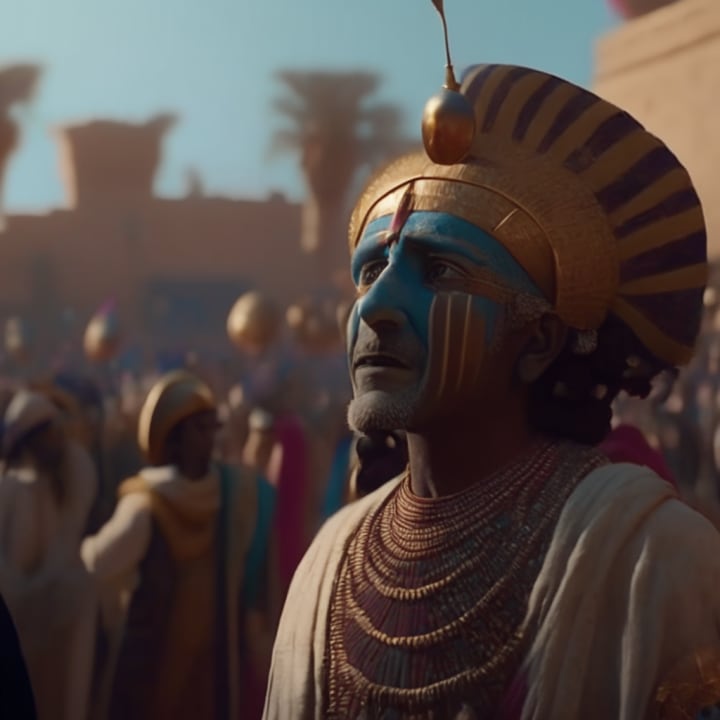
In recognition of Ptolemy's unrivaled wit and ability to spread laughter throughout the kingdom, a grand festival was organized in his honor. Jesters, clowns, and mimes gathered from all corners of the realm; their antics interwoven with Ptolemy's uproarious tales.
The festival, aptly named the Grand Festival of Fools, transformed Alexandria into a riotous celebration of laughter. People from far and wide flocked to the city, donning colorful costumes and painted smiles. The streets reverberated with the sounds of juggling balls, the honking of clown noses, and the merriment of a populace united by the power of humor.
Ptolemy took the center stage, regaling the crowd with his tales of scribal shenanigans. Each word he uttered was met with peals of laughter, creating a symphony of joy that resonated throughout the city. Jesters performed gravity-defying tricks, clowns tumbled and stumbled, and mimes painted invisible masterpieces, all in homage to the quirky scribe who had brought laughter to their lives.
The festival became a testament to the transformative power of laughter. Strangers embraced in fits of giggles; their differences set aside in the shared delight of the moment. Laughter became the language that transcended barriers, connecting people from all walks of life and fostering a sense of unity and understanding.
And so, dear reader, as you close the final chapter of Ptolemy's whimsical journey, let us ponder: What would our world be like if we embraced the power of laughter and allowed humor to guide us through the complexities of life? Can we, like Ptolemy, find the joy in every situation and bring smiles to the faces of those around us? Perhaps the answer lies within each of us, waiting to be discovered amidst the scribal shenanigans and laughter that await.
Epilogue: Ptolemy's Everlasting Laughter
Ptolemy's name became synonymous with laughter and merriment throughout the ages. His tales of comedic scribal escapades were passed down from generation to generation, inspiring future scribes to wield their quills with humor and lightness. The memory of Ptolemy, the quirky scribe who brought laughter to the ancient world, remained etched in the annals of history, ensuring that his legacy would forever brighten the darkest corners of human existence.
Question for the readers: Have you ever encountered a situation where humor transformed a mundane experience into something unforgettable? How did laughter change the dynamics of that moment?
About the Creator
Shawn F
Aspiring to become a passionate chiropractor, entrepreneur & health advocate. LifeWave partner. Inspiring #holisticwellness, educating, and creating positive change. Committed to empowering individuals. #Health #Wellness #Entrepreneur






Comments
There are no comments for this story
Be the first to respond and start the conversation.